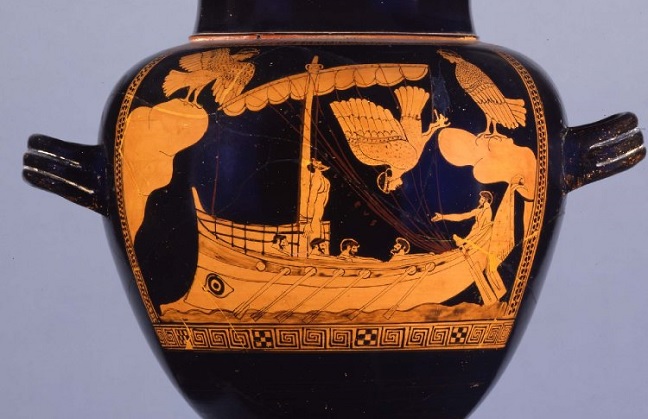Week 3. Herodotus and Zhang Qian: Travel and ‘the Other’ in the Ancient World
People have always travelled and told stories about their travels. Throughout history, such narratives have both pushed and policed boundaries of the known and unknown, Self and Other, normative and deviant. This week we start exploring the deep history of travel and its multiple uses as a historical source by looking at two of the most famous historians from the ancient world, Herodotus and Sima Qian. Our aim will be to begin cataloguing the broad range of questions and perspectives that we can ask, apply, and obtain by studying travel, focusing on the traveller, the travellees, and their multiple audiences.
Core Readings
Steven Gosch and Peter Stearns, Premodern Travel in World History (New York: Routledge, 2008), pp. 50-72. LinkLink opens in a new window.
Roxanne L. Euben, Journeys to the Other Shore: Muslim and Western Travelers in Search of Knowledge (Princeton, NJ: Princeton University Press, 2008), pp. 46-63. LinkLink opens in a new window.
Primary sources (select one)
Herodotus, The Persian Wars, Volume II: Books 3-4, trans. A.D. Godley (Cambridge, MA: Harvard University Press, 1921), Book IV, chs. 16-45 (pp. 217-247). LinkLink opens in a new window.
Sima Qian, Records of the Grand Historian of China, Vol. 2, trans. Burton Watson (New York: Columbia University Press, 1971), 'Shi Ji 123: The Account of Dayuan', pp. 231-252. LinkLink opens in a new window
Seminar Questions
1. What were the factors motivating and facilitating travel in Han China? To what extent were these factors particular to this time and place?
2. Review the three arguments of Roxanne Euben (p. 51): are they applicable to other travel accounts you've read? Are there any aspects you find questionable?
3. How do we assess the value of travel accounts as historical sources? Can we strip away layers of subjectivity to arrive at underlying facts? If so, how? If not, how should we read travel records instead?
4. Consider Hartog's concept of the "absent model" as discussed by Euben. How useful do you find it as a tool for understanding travel texts? Do you see it in operation in Sima Qian and/or Herodotus?
5. How do truth claims operate in Herodotus account of northern regions? For what purposes can we study such claims?
Further Reading
Benjamin, Craig, Empires of ancient Eurasia: The First Silk Roads Era, 100 BCE - 250 CE (Cambridge: Cambridge University Press, 2018), Ch. 3: 'Zhang Qian and Han Expansion into Central Asia', pp. 68-90. LinkLink opens in a new window.
Burgess, Jonathan S.,'Travel Writing and the Ancient World', in: Nandini Das and Tim Youngs (eds.), The Cambridge History of Travel Writing (Cambridge: Cambridge University Press, 2019), pp. 19-32. LinkLink opens in a new window.
Casson, Lionel, Travel in the Ancient World (London: Allen & Unwin, 1974).
Clarke, Katherine, Shaping the Geography of Empire: Man and Nature in Herodotus' Histories (Oxford: Oxford University Press, 2018). LinkLink opens in a new window.
Di Cosmo, Nicola, Ancient China and its Enemies: The Rise of Nomadic Power in East Asian History (Cambridge: Cambridge University Press, 2002). LinkLink opens in a new window.
Hartog, François, Janey Lloyd (trans.), The Mirror of Herodotus: The Representation of the Other in the Writing of History (Berkeley, CA: University of California Press, 1988). LinkLink opens in a new window.
Karttunen, Klaus, 'The Ethnography of the Fringes', in: Egbert J. Bakker, Irene J.F. de Jong, and Hans van Wees (eds.), Brill's Companion to Herodotus (Leiden: Brill, 2002), pp. 457-474. LinkLink opens in a new window.
Redfield, James, 'Herodotus the Tourist', in: Thomas Harrison (ed.), Greeks and Barbarians (Edinburgh: Edinburgh University Press, 2002), pp. 24-49. LinkLink opens in a new window.
Rood, Tim, 'Herodotus and foreign lands', in: Carolyn Dewald and John Marincola (eds.), The Cambridge Companion to Herodotus (Cambridge: Cambridge University Press, 2006), pp. 290-305. LinkLink opens in a new window.
Skinner, Joseph E. The Invention of Greek Ethnography: From Homer to Herodotus (Oxford: Oxford University Press, 2012). LinkLink opens in a new window.
Stuurman, Siep, 'Herodotus and Sima Qian: History and the Anthropological Turn in Ancient Greece and Han China', Journal of World History 19.1 (2008), pp. 1-40. LinkLink opens in a new window.
Stuurman, Siep, The Invention of Humanity: Equality and Cultural Difference in World History (Cambridge, MA: Harvard University Press, 2017). LinkLink opens in a new window.
Thomas, Rosalind, Herodotus in Context: Ethnography, Science and the Art of Persuasion (Cambridge: Cambridge University Press, 2010). LinkLink opens in a new window.


